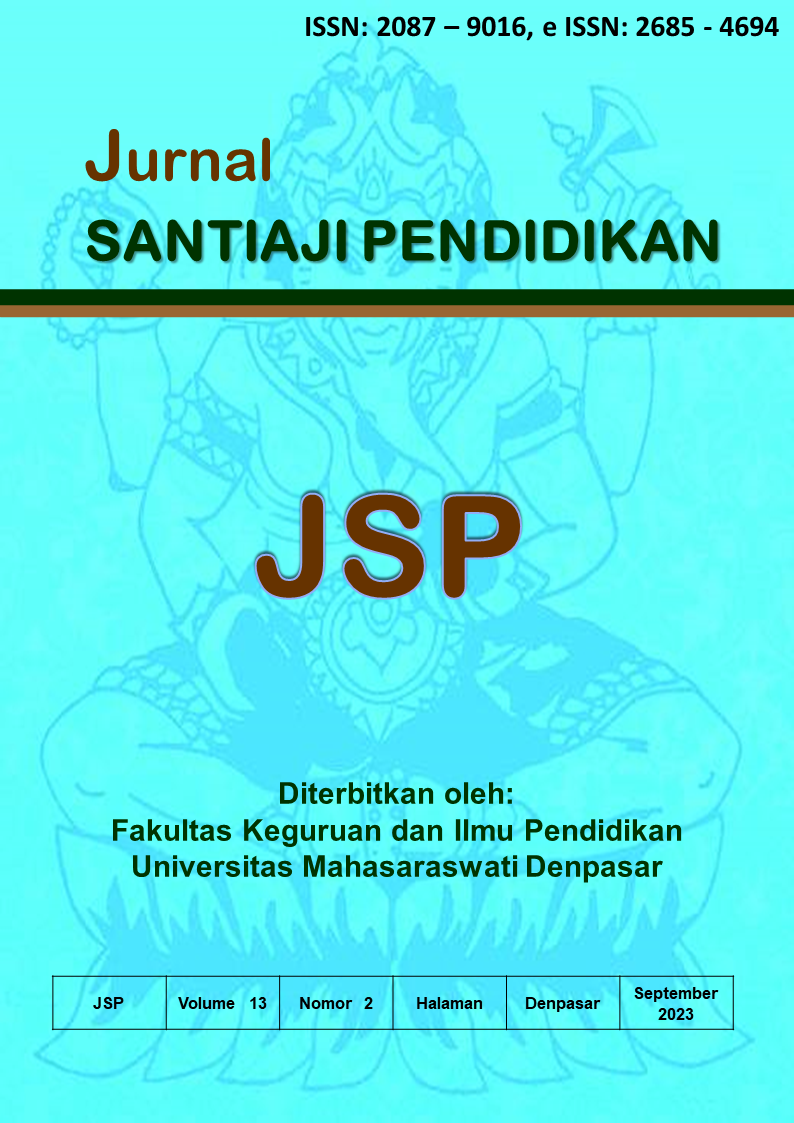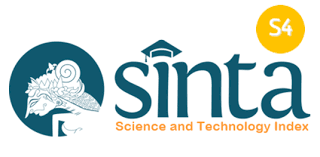WORDS PROCESSING AND ANTICIPATION ABILITY BY EFL LEARNERS
DOI:
https://doi.org/10.36733/jsp.v13i2.7510Keywords:
Kata Mental, Pemrosesan Kata, Antisipasi Kata, Pembelajaran Bahasa InggrisAbstract
Dengan pengetahuan tentang proses mental kata maupun frasa bahasa Inggris, guru EFL dapat mengaktivasi kemampuan siswa dalam mengantisipasi kata sesuai konteks. Akan tetapi, tidak banyak rujukan yang dapat membantu menjelaskan fenomena ini. Untuk itu, penelitian ini bertujuan untuk menjelaskan bagaimana kecenderungan siswa EFL dalam mengantisipasi kata baik dalam ujaran maupun tulisan. Untuk mencapai tujuan tersebut penelitian ini menggunakan pendekatan deskriptif kuantitatif dan kualitatif. 20 Partisipan yang direkut adalah siswa SLUB kelas Bilingual. Intrumen yang digunakan adalah 10 test tulis dan 10 test pancingan lisan. Data dianalis secara deskriptif melalui analisis konten dari perspetif teori sistem antisipasi kata. Hasil penelitian mengindikasikan kemampuan siswa mengantiipasi kata dalam tulisan dikategorikan “sedang” sementara untuk lisan dinilai “rendah”. Terdapat kecenderungan yang signifikan siswa memilih kata dengan tepat berdasarkan pengetahuan makna seluruh kalimat dan pertimbangan hubungan makna kata dalam pilihan yang disediakan. Sementara, analisis konten menunjukkan bahwa siswa memilih kata berdasarkan kata sebelumnya bukan setelahnya. Artinya kata yang tepat muncul dengan mengantisipasi fitur-fitur semantik dan gramatikal kata yang diikuti bukan bukan sebaliknya. Dengan temuan ini, guru EFLdisarankan untuk menstimulasi fitur-fitur semantik kata yang memeiliki agreement dengan kata -kata lain dalam konteks mellaui strategi pengajaran yang inovatif.
Downloads
References
Bernice, A. (2021). Language and the Brain: A Twofold Study of Language Production and Language Comprehension as a Separate or Integrated Set of Processes. Journal of English Language Teaching and Applied Linguistics , 3(5 SE-Articles), 82–90. https://doi.org/10.32996/jeltal.2021.3.5.9
Creswell, J. W. (2012). Educational research: Planning, conducting, and evaluating quantitative and qualitative research. Pearson Education, Inc.
De Houwer, A. (1990). The acquisition of two languages from birth: A case study. Cambridge University Press.
de I’Etoile, S. K. (2002). The Effect of a Musical Mood Induction Procedure on Mood State-Dependent Word Retrieval. Journal of Music Therapy, 39(2), 145–160. https://doi.org/10.1093/jmt/39.2.145
Desideri, L., & Bonifacci, P. (2018). Verbal and Nonverbal Anticipatory Mechanisms in Bilinguals. Journal of Psycholinguistic Research, 47(3), 719–739. https://doi.org/10.1007/s10936-017-9556-1
Foucart, A., Martin, C. D., Moreno, E. M., & Costa, A. (2014). Can bilinguals see it coming? Word anticipation in L2 sentence reading. Journal of Experimental Psychology: Learning, Memory, and Cognition, 40(5), 1461. https://doi.org/10.1037/a0036756
Georgiev, D. D., Georgieva, I., Gong, Z., Nanjappan, V., & Georgiev, G. V. (2021). Virtual Reality for Neurorehabilitation and Cognitive Enhancement. In Brain Sciences (Vol. 11, Issue 2). https://doi.org/10.3390/brainsci11020221
Goldinger, S. D., Luce, P. A., & Pisoni, D. B. (1989). Priming lexical neighbors of spoken words: Effects of competition and inhibition. Journal of Memory and Language, 28(5), 501–518. https://doi.org/https://doi.org/10.1016/0749-596X(89)90009-0
Gow, D. W. (2001). Assimilation and Anticipation in Continuous Spoken Word Recognition. Journal of Memory and Language, 45(1), 133–159. https://doi.org/https://doi.org/10.1006/jmla.2000.2764
James, L. E., & Burke, D. M. (2000). Phonological priming effects on word retrieval and tip-of-the-tongue experiences in young and older adults. In Journal of Experimental Psychology: Learning, Memory, and Cognition (Vol. 26, Issue 6, pp. 1378–1391). American Psychological Association. https://doi.org/10.1037/0278-7393.26.6.1378
Levelt, W. J. M. (1992). Accessing words in speech production: Stages, processes and representations. Cognition, 42(1), 1–22. https://doi.org/10.1016/0010-0277(92)90038-J
Levelt, W. J. M. (2001). Spoken word production: A theory of lexical access. Proceedings of the National Academy of Sciences, 98(23), 13464–13471. https://doi.org/10.1073/pnas.231459498
Louie, A. H. (2012). Anticipation in (M,R)-systems. International Journal of General Systems, 41(1), 5–22. https://doi.org/10.1080/03081079.2011.622088
Magyari, L., Bastiaansen, M. C. M., de Ruiter, J. P., & Levinson, S. C. (2014). Early Anticipation Lies behind the Speed of Response in Conversation. Journal of Cognitive Neuroscience, 26(11), 2530–2539. https://doi.org/10.1162/jocn_a_00673
Magyari, L., & De Ruiter, J. P. (2012). Prediction of turn-ends based on anticipation of upcoming words. Frontiers in Psychology, 3, 376. https://doi.org/10.3389/fpsyg.2012.00376
McCarthy, M., Christian, M., & Slade, D. (2019). Discourse analysis. In An introduction to applied linguistics (pp. 55–71). Routledge.
Nadin, M. (2010). Anticipation and dynamics: Rosen’s anticipation in the perspective of time. International Journal of General Systems, 39(1), 3–33. https://doi.org/10.1080/03081070903453685
Onal, K. D., Zhang, Y., Altingovde, I. S., Rahman, M. M., Karagoz, P., Braylan, A., Dang, B., Chang, H.-L., Kim, H., McNamara, Q., Angert, A., Banner, E., Khetan, V., McDonnell, T., Nguyen, A. T., Xu, D., Wallace, B. C., de Rijke, M., & Lease, M. (2018). Neural Information Retrieval: at the End of the Early Years. Information Retrieval Journal, 21(2), 111–182. https://doi.org/10.1007/s10791-017-9321-y
Pawley, A., & Syder, F. H. (2014). Two puzzles for linguistic theory: Nativelike selection and nativelike fluency. In Language and communication (pp. 203–239). Routledge.
Poli, R. (2010). The many aspects of anticipation. Foresight, 12(3), 7–17. https://doi.org/10.1108/14636681011049839
Roelofs, A. (1997). A Case for Nondecomposition in Conceptually Driven Word Retrieval. Journal of Psycholinguistic Research, 26(1), 33–67. https://doi.org/10.1023/A:1025060104569
Rosen, J., & Kineman, J. J. (2005). Anticipatory systems and time: a new look at Rosennean complexity. Systems Research and Behavioral Science: The Official Journal of the International Federation for Systems Research, 22(5), 399–412. https://doi.org/10.1002/sres.715
Rossel, P. (2010). Making anticipatory systems more robust. Foresight, 12(3), 72–85. https://doi.org/10.1108/14636681011049893
Simpson, G. B., & Burgess, C. (1985). Activation and selection processes in the recognition of ambiguous words. Journal of Experimental Psychology: Human Perception and Performance, 11(1), 28. https://doi.org/10.1037/0096-1523.11.1.28
Sugiyono, D. (2013). Metode penelitian pendidikan pendekatan kuantitatif, kualitatif dan R&D.
Van Berkum, J. J. A. (2009). The neuropragmatics of’simple’utterance comprehension: An ERP review. In Semantics and pragmatics: From experiment to theory (pp. 276–316). Palgrave Macmillan.
Van Petten, C., & Kutas, M. (1990). Interactions between sentence context and word frequencyinevent-related brainpotentials. Memory & Cognition, 18(4), 380–393. https://doi.org/10.3758/BF03197127
Wicha, N. Y. Y., Moreno, E. M., & Kutas, M. (2004). Anticipating Words and Their Gender: An Event-related Brain Potential Study of Semantic Integration, Gender Expectancy, and Gender Agreement in Spanish Sentence Reading. Journal of Cognitive Neuroscience, 16(7), 1272–1288. https://doi.org/10.1162/0898929041920487
Downloads
Published
Issue
Section
License
Copyright (c) 2023 I Ketut Wardana

This work is licensed under a Creative Commons Attribution 4.0 International License.











